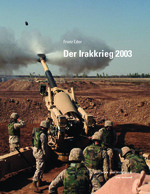Der Irakkrieg 2003
| dc.contributor.author | Eder, Franz | |
| dc.date.accessioned | 2018-07-13 13:20:31 | |
| dc.date.accessioned | 2020-04-01T12:35:07Z | |
| dc.date.available | 2020-04-01T12:35:07Z | |
| dc.date.issued | 2015 | |
| dc.identifier | 1000283 | |
| dc.identifier | OCN: 1051778171 | en_US |
| dc.identifier.uri | http://library.oapen.org/handle/20.500.12657/29660 | |
| dc.description.abstract | Why did the Bush administration decide to go to war against Iraq in March 2003? The aim of this book is to give answers to this question. An integrative model for foreign policy analysis shows that the causes of this decision are both at the level of the individual (the heightened sense of threat triggered by 9/11), the level of the collective (the group consensus for a policy of "coercive diplomacy"). , as well as at the level of the international system (the image of the enemy Iraq). In summary, it is argued that in a political environment where the population demands maximum security, policy inevitably tends to overreact and wrong decisions become more likely. | |
| dc.language | German | |
| dc.subject.classification | thema EDItEUR::N History and Archaeology::NH History::NHK History of the Americas | en_US |
| dc.subject.classification | thema EDItEUR::N History and Archaeology::NH History::NHW Military history | en_US |
| dc.subject.classification | thema EDItEUR::J Society and Social Sciences::JP Politics and government::JPA Political science and theory | en_US |
| dc.subject.classification | thema EDItEUR::J Society and Social Sciences::JW Warfare and defence::JWL War and defence operations | en_US |
| dc.subject.other | War | |
| dc.subject.other | Foreign Policy | |
| dc.subject.other | USA | |
| dc.subject.other | Krieg | |
| dc.subject.other | Außenpolitik | |
| dc.subject.other | Akteur | |
| dc.subject.other | Diskurs | |
| dc.subject.other | Gruppendenken | |
| dc.subject.other | Irak | |
| dc.subject.other | Irakkrieg | |
| dc.subject.other | Vereinigte Staaten | |
| dc.title | Der Irakkrieg 2003 | |
| dc.type | book | |
| oapen.abstract.otherlanguage | Warum entschied sich die Administration Bush im März 2003, gegen den Irak in den Krieg zu ziehen? Ziel dieses Buches ist es, Antworten auf diese Frage zu geben. Mit Hilfe eines integrativen Modells zur Analyse von Außenpolitik wird gezeigt, dass die Ursachen für diese Entscheidung sowohl auf Ebene des Individuums (dem gesteigerten Bedrohungsgefühl ausgelöst durch 9/11), der Ebene des Kollektivs (dem Gruppenkonsens für eine Politik der „coercive diplomacy“), als auch auf der Ebene des internationalen Systems (dem Feindbild Irak) zu finden sind. Es wird zusammenfassend argumentiert, dass in einem politischen Umfeld, in dem von der Bevölkerung ein Maximum an Sicherheit gefordert wird, die Politik zwangsläufig zur Überreaktion neigt und Fehlentscheidungen wahrscheinlicher werden. | |
| oapen.identifier.doi | 10.15203/2936-75-2 | |
| oapen.relation.isPublishedBy | 7e4aa047-ebd5-4269-b6c8-a86925324b93 | |
| oapen.relation.isbn | 9783902936752 | |
| oapen.collection | AG Universitätsverlage | |
| oapen.pages | 440 | |
| oapen.remark.public | Relevant Wikipedia pages: Akteur - https://de.wikipedia.org/wiki/Akteur; Diskurs - https://de.wikipedia.org/wiki/Diskurs; Gruppendenken - https://de.wikipedia.org/wiki/Gruppendenken; Irak - https://de.wikipedia.org/wiki/Irak; Irakkrieg - https://de.wikipedia.org/wiki/Irakkrieg; Vereinigte Staaten - https://de.wikipedia.org/wiki/Vereinigte_Staaten | |
| oapen.identifier.ocn | 1051778171 |

